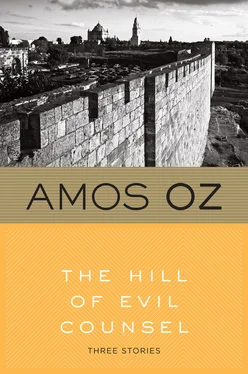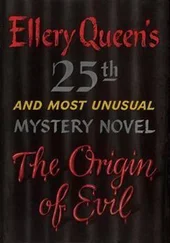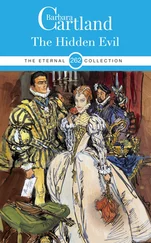At lunchtime, he would fry potatoes for us all and share some sausages with his father. Then he would strip off his overalls and collapse onto the sweaty mattress in his underwear, as if exhausted by a hard morning's work. He slept restlessly till the onset of twilight, while we guarded him from the girls.
But in the evenings, I saw Ephraim come to hidden life, and then I was truly his lieutenant. He shinned up the drainpipe like a shadowy cat, rigged up various antennas on the roof, and began experimenting with frequencies. My task was to sit in the dark workshop among the glowing receivers and write down what I heard. Until I was called home to bed, and he continued on his own to search relentlessly for the single elusive signal that he was trying to isolate from the stream of astral rays.
Once he condescended to favor me with a simplified explanation. Gravity is a form of radiation. Here, look: in my left hand a hammer, in my right a cigarette; they both hit the ground at exactly the same time, but not with the same impact. Nature always contrives to produce opposing pairs: life and death, fire and water, hope and despair. So there must be some contrary ray somewhere that counteracts the ray of gravity and once we've found it everything will be possible and now just you scram and forget everything you've heard.
I could not understand the scientific meaning of all this. But as a military man myself, I fully realized what fate lay in store for the British Empire once we had mastered this secret ray.
Once in a while, one of the girls would slip through our defenses and manage to reach Ephraim and spend the night with him. But even on these nights, Ephraim did not switch off the receivers that brought him the astral signals. Lovemaking must have taken place inside his room to the accompaniment of piercing bleeps and whistles from outer space. Or perhaps not love, but some other kind of union that was not ugly, not sweaty, something I would have given my life to share and once I even crept up behind the shuttered window in the dark and hid like an owl in the sticky pepper tree and strained with all my might to hear and I shivered at the sounds I heard in the darkness because I did not know if they were sobs or muffled laughs or radio signals from the stars, and suddenly I panicked and the pepper tree smeared me with a bitter stickiness and I thought that everything was about to shatter to smithereens and that Ephraim and the girl would die and Mr. Nehamkin and Mommy and Daddy would die and I would be left all alone in the ashes of Jerusalem and the smell of the pepper tree would give me away and bloodthirsty gangs would swoop down on Jerusalem out of the mountains and I would be all alone. So I slipped down from the tree and crept around the house in the dark. I was startled by a startled cat. I stood at the window of the old poet's room, pressed my face against the wire mesh, and shouted in a whisper:
"Mr. Nehamkin! Please! Mr. Nehamkin!"
But he did not hear me. He could not possibly hear me. He was sitting, as usual, building a model of the Temple out of used matchsticks, following the descriptions in Scripture and in other sources. It was a project that had been going on for years, and its completion was receding further and further into the distance, because, as he explained to me, the evidence of the various sources was inconsistent, and he was constantly obliged to dismantle and rebuild it, now according to one plan and now according to another.
With his large, pale fingers, he dipped matchstick after matchstick into a bowl of flour-and-water paste. He had a piece of twine gripped between his teeth, and all the time he hummed to himself:
Our Father, our King,
Have mercy upon us and answer us
Although we deserve it not.
Afterward, lying in bed, scratched and smelling of pepper, I could hear the fervent worshipers in the Faithful Remnant Synagogue, gathered for the Midnight Vigil. The summer would soon be over, and the Days of Awe would be upon us.
And outside, in the warm darkness, something was enraging or terrifying the dogs of the neighborhood and making them hesitate between barking and howling.
4
Ephraim was a sharp-witted but impatient chess player. Father sometimes managed to beat him because he refused to take risks and always conducted a cautious defensive campaign.
"Slow but sure," Ephraim would say condescendingly when Father occasionally succeeded in capturing a defenseless pawn on the outskirts of the field of combat.
Father was not offended. He merely urged:
"Concentrate, Ephraim. Don't give up yet. I shouldn't mind changing places with you, even with your present setup."
Ephraim dismissed this offer with a single contemptuous word: "Today!" He suggested they quit chattering and get on with the real business:
"You're just trying to confuse me with your speechifying, Kolodny. But any moment now, you'll find yourself in a spot, and then you won't feel much like making speeches."
"We'll soon see," Father replied mildly. "Meanwhile I'm besieging your castle, and I've made a good meal of your pawn."
"Make the most of it," Ephraim said angrily. "Nibble the bait to your heart's content; I'm ready with my rod and line."
"We'll see," Father repeated affectionately.
They sat facing each other across the heavy brown living-room table: Ephraim short and dark, his head held forward as if ready to charge, his shirt deliberately unbuttoned to show off his curly-haired chest; Father in a vest and a pair of khaki shorts that were a bit too large for him, his cheeks pink and close-shaven, the corners of his eyes wrinkled in a smile that I secretly called his "schoolmasterly smile."
The chessboard lay on the table between them, surrounded by nuts, biscuits, apples, and pale-blue paper napkins printed with pictures of white-sailed fishing boats. There was also a china ashtray in the form of a woman's cupped hand. Among the various delicacies stood a yogurt pot containing some wilting white roses. From time to time, a yellowing petal landed gently on the oilcloth that covered the table, and found a rejuvenating echo in the vividly colored roses that were printed all over it. Father would instantly seize the dead petal, fix it with a concentrated stare, and fold it skillfully into ever-smaller squares.
Ephraim would pick up a knight or a bishop, tap it impatiently on the boards as if calling Father to order, and say:
"Why ponder, Kolodny? You've got no choice."
Father:
"Yes. You're right, I'm just trying to decide which is the lesser of two evils."
Mother, from her perch on the piano stool, said:
"Calm down, you two. It's not worth getting worked up over a game."
This remark seemed to me to be uncalled for: it was not Father and Ephraim who were getting worked up.
The living room was simply and cheerfully furnished. The curtains were bright and airy, the ceiling was painted pale-blue, and the walls were patterned with tiny flowers, as if the decorator had fancied himself a gardener, rather than a painter. Behind the sliding glass doors of the sideboard, the dinner service was neatly displayed in serried ranks, like troops ready to be reviewed by a high-ranking officer. There was a chandelier with four intertwining branches, each surmounted by a bud-shaped light bulb.
On the other side of the room hung a bookshelf containing a Bible with a modern commentary, the Gazetteer of Palestine, a history of the Jews and a concise world history, the complete poems of Bialik, selected poems of Chernikhovsky, and Gur's Hebrew Dictionary. A volume entitled Gems of Literature lay on its side on top of the other books, because there was no room for it on the shelf. Above the sideboard hung a picture of a pioneer pushing a plow through a field in the Jezreel Valley, oblivious of the black crows hovering over Mount Gilboa in the top corner of the picture. On top of Mother's piano stood a plaster bust of Chopin, which I secretly called Mr. Szczupak because it reminded me a little of the proprietor of Riviera Fashions on King George Street. The bust bore a legend in Polish that Mother translated for me as "With all the warmth of my heart and until my dying breath." Next to my window sill, the Jewish National Fund collection box hung from a thick nail. It was adorned with a map of the country, with the areas we had already won back filled in in brown. I could not restrain myself: I took my box of paints and drew one arrow from Jerusalem northward through Gilead and the Golan toward Mount Lebanon, and another southeastward to the borders of Moab on the shores of the Dead Sea. As a result of this pincer movement, it became possible to paint the whole map brown, and so to gain possession of the whole country. At first Father was angry, and insisted that I carefully wash and dry the box and remove every trace of this piece of cleverness. Then he changed his mind, his face broadened into one of his schoolmasterly smiles, and he said:
Читать дальше











